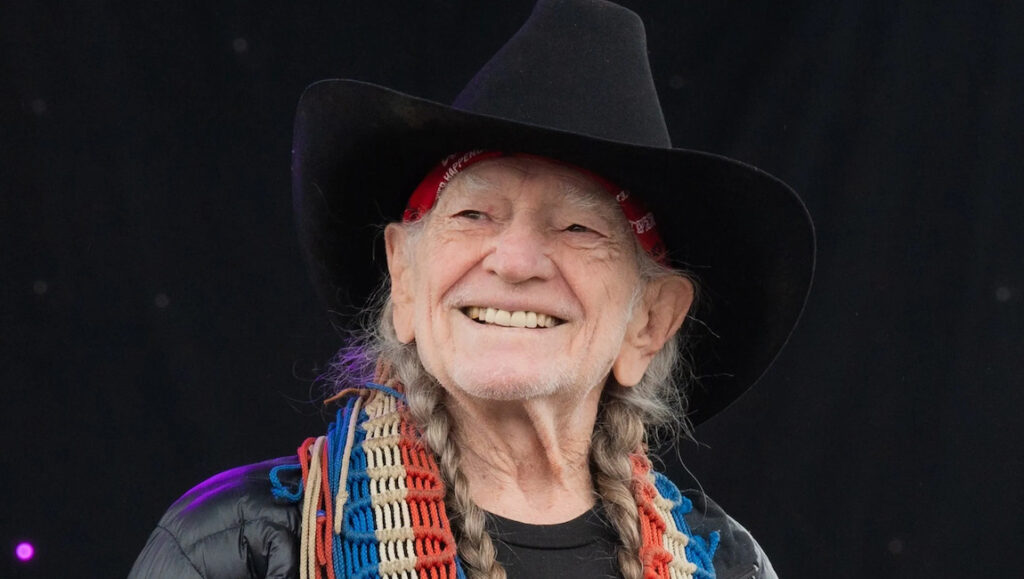A Beautiful Time is as rich an emotional experience as it is a masterful work of craftsmanship.
Truly great Willie Nelson albums come in many different shapes, sizes, and styles: there’s the murder ballad-cum-redemption narrative of Red Headed Stranger, which wouldn’t have fared so well post-cancel culture, but which is still one of the most vivid story-albums in the popular music canon; the crooner-classic Stardust, still among the best set of standards put to record; the all-instrumental swing-jazz album Nelson cut with his late-’90s touring band, which doubles as a tribute to his self-professed hero, Django Reinhardt; the barn-burner of a collab album with fellow country legend Hank Snow; and the delicate and ruminative collab cut with the late Sister Bobbie. No favored formula — and he has a stable of them — always produces a winner: but if one album doesn’t hit, another (maybe two!) usually arrives in the succeeding 12 months or so.
Of course, that won’t always be true, which makes for a heck of a lot more sense when pointing out that any foolhardy suggestions that A Beautiful Time — 89-year-old Nelson’s seventy-second solo album — could be his last. Willie himself pokes fun at that more morbid notion therein with a bit of pitch-perfect levity: “Live every day like it was your last one / Because one day you’re gonna be right.” And while mortality is clearly on Nelson’s mind throughout, A Beautiful Time registers as something quite a bit different from what Robert Christgau once coined as the “nearness-of-death” album — referring to Warren Zevon’s The Wind and Johnny Cash’s American IV, among others. In part, that’s because death is a lot harder to pin down here: It’s an occasion for a “picking party” with Waylon Jennings, Merle Haggard, et. al on “I Don’t Go to Funerals,” and on the bookending “I’ll Love You Till the Day I Die” and “Leave You With a Smile,” it’s a reason to love with everything you’ve got, while you have the chance.
Romantic, wise, funny — A Beautiful Time is as rich an emotional experience as it is a masterful work of craftsmanship. Two classics anchor the set, both likely near-impossible lifts for anyone who isn’t the premiere interpretive singer in American music. Nelson wrings jazz and r&b out of Leonard Cohen’s “Tower of Song,” with lonesome harmonica blowing like a train whistle and a Daniel Lanois-ish solo expanding the sonic palette, harkening back to 1998’s Teatro. The phrasing is impeccable, an uncommon example of a singer recognizing the gravity and pathos of a great text — from the gritty, assertive way Nelson approaches Cohen’s still-resonant sociopolitical musings (“the rich have got their channels in the bedrooms of the poor”) to the tender and vulnerable cadence of the gorgeous bridge, which does such a good job of breaking out of the theatrical folk template of the original that it sounds written to be performed as a bluesy torch song. A similar resourcefulness transforms “With a Little Help from My Friends,” turning the Beatles’ psychedelic Brit pop novelty into an earthy reverie — with whining pedal steel and rolling barroom piano setting the scene, while Nelson’s earnest care for every word he sings reveals layers of lyricism (“What do you see when you turn out the light / I can’t tell you but I know that it’s mine”) that the original wouldn’t have you thinking quite so deeply about.
Nelson has built more than one of his truly great albums from shrewdly selected and sequenced covers. But there are also a handful of exceptional originals on A Beautiful Time (all penned with longtime producer Buddy Cannon) that help to bring this great songwriter’s own personality and perspective to the set. The best of these — and, in fact, Nelson’s best new song since “Laws of Nature,” off 2014’s December Day — is “Energy Follows Thought,” a meditation on — of all things, in this age of excess and confrontation — the virtue of restraint; a gentle reminder to fix your mind and an effort to caution against reckless action. The music, sparse and textural, compliments the message, with Nelson’s evocative and abstract picking drawing out the latent ambiguities of his koan-like lyricism. More pro-forma in terms of style but just as expert is “My Heart Was a Dancer,” the kind of blue-collar story-song that represents the best of the outlaw country movement during which Willie came to prominence, while “I Don’t Go to Funerals” is the type of lighter, joke-y fare that Nelson has less reliably succeeded at in recent years — but here it’s cut with just enough biting wit, as well as a fantastic guitar solo, as to elevate it close to the level of the rest of this set. And while some might point to signs on this album of a diminishing vocal, and be fair in doing so — only now, at almost 90, is the greatest singer in American music starting to show tangible limitation in the high and low ranges of his voice — he still somehow ends up nailing the most demanding moments here, like the octave-jumping falsetto of “Leave You With a Smile.” That song, which ends this set on a moving and reflective note, succinctly reiterates Nelson’s take on the themes of this album: “If I could make my time with you stand still / There’d be no time that I would want to kill.” As much as he’s not afraid of death, he’s still enamored with life, and more inclined than ever to relish its best moments.
Published as part of Album Roundup — April 2022 | Part 3.


Comments are closed.